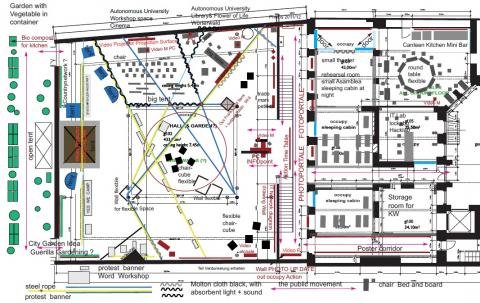I spent today at a TEDx event organized by NYU students. I was approached to participate by a woman who had taken one of my classes. I wasn’t sure I really wanted to do it, so, knowing that most of the organizers were from the Business School, I proposed a talk on the student debt crisis, expecting them to reject it. But they called my bluff.
 So I presented the now-familiar cocktail (to regular readers) of $1 trillion of student debt, the 27% default rate and declining applications to high-cost institutions. I localized it by considering the rising debt crisis at NYU. At present some 55% of NYU students graduate in debt with the average debt amounting to just over $40,000.
So I presented the now-familiar cocktail (to regular readers) of $1 trillion of student debt, the 27% default rate and declining applications to high-cost institutions. I localized it by considering the rising debt crisis at NYU. At present some 55% of NYU students graduate in debt with the average debt amounting to just over $40,000.
Some of this is unintended debt. One young man came into a class of mine last semester smiling broadly. When I asked him why, he said that the loan office had given him four times as much money as he had requested. Horrified, I asked why he had accepted it and he said: “Free money!” If only it was. No surprise then that NYU ranks #6 in the nation for student debt. Ahead are a group of very much less well-known institutions, such as the Florida Institute of Technology and Barry University, scarcely the New Ivy company that NYU likes to claim for itself.
So we are all puzzled that NYU has launched an expansion plan that will build immense new towers across the middle of Greenwich Village, including a hotel. No indication has been provided as to how this will be paid for but NYU has announced that “[it] is not afraid of debt.” Perhaps it should be. It has been calculated that, if you use a low estimate of $4 bn. for the construction, the interest payments alone would be more than the current tuition and fees generated by the flagship College of Arts and Science.
The University is pursuing debt financing like never before at what may turn out to be precisely the wrong time.For other participants in the TEDx event highlighted the continuing impact of the global financial crisis, arguing that it was likely to redefine our sense of how markets operate–in this new context, debt is certainly something to be concerned about.
There’s another form of convergence going on, whose consequences are less clear. No less than three TEDx presentations highlighted the interface between new ideas about marketing, the viral idea, and the global Occupy movement. All the presenters wanted to see socially good results from this, but it’s not hard to see how others might try and appropriate it.
The concern about being co-opted is widespread in Occupy circles at the moment. Are the Move On 99% training sessions–direct imitations of the OWS Spring Training–which are patently directed towards promoting the Democratic Party, a good thing or not? We can take a positive view and see the progressive wing of the Democrats being mobilized by Occupy. Or we can be less sanguine and see the ideas as being diluted into the usual election-year boilerplate.
Another discussion is happening around the Berlin Biennale, one of the many global art fairs, hosting a space for Occupy (as above). Based on discussions with Occupy Berlin, the space includes recycling, a garden, an autonomous university and undefined action space. Here Occupy is rendered into a shopping list for a want-to-be radical art fair, whose ultimate rationale is the continuation of the global art market, the epitome of one percent luxury furnishing.
Yet the very packaged nature of the Move On and Berlin Biennale projects misses the key element to all viral memes–the unexpected. These gestures are so predictable within the context of two-party politics and art world solipsism that I’m not sure I can even be bothered to be annoyed by them.
The last convergence is the most obvious–the interface between Occupy and structured digital media platforms like TEDx, which is a licensed and carefully-filtered project:
- TED does not grant licenses to those associated with controversial or extremist organizations.
- TEDx events may not be used to promote spiritual or religious beliefs, commercial products or political agendas.
Given that, as Alessandra Renzi pointed out in her recent talk at NYU, many apparently familiar organizations are now being officially designated as “extremist” from environmental groups to art activist performers The Yes Men, you wonder how such filtering is applied.
Organizers of TEDx events always hope that one of their talks gets “promoted” to the highlighted section of the site. My guess is that a talk on student debt–especially one given by a surprisingly nervous professor–won’t make that list. Except maybe with a little help from his friends…now that would be unexpected;) Links to follow.


Nex is Coming